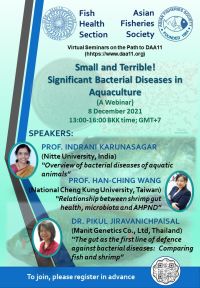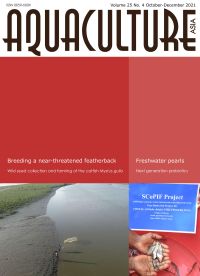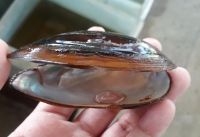The Fish Health Section of the Asian Fisheries Society will hold a free webinar on significant bacterial diseases in aquaculture on 8 December, via Zoom. Presentations are: Overview of bacterial diseases of aquatic animals (Prof. Indrani Karunasagar, Nitte University); Relationship between shrimp gut health, microbiota and AHPND (Prof. Han-Ching Wang, National Cheng Kung University), and The gut as the first line of defence against bacterial diseases: Comparing fish and shrimp (Dr Pikul Jiravanichpaisal, Mani Genetics Co.). Participation is open but registration is required.
A free virtual seminar series will be held from 13-17 December, hosted by the Freshwater Fisheries Research Center, Chinese Academy of Fisheries Sciences, in partnership with NACA and the Chinese Ministry of Agriculture and Rural Affairs. The seminar will be held via Zoom. It will give participants a background in aquatic resource conservation practices, recommend options for sustainable aquaculture farming systems with potential for intensification with intervention strategies, and build a communication and experience exchange platform for information dissemination and future collaboration. Participation is free. Registration closes 10 December.
In this issue:
Habitat breeding and seed rearing of a near threatened featherback, Chitala chitala; Wild seed collection and modified-extensive farming of Mystus gulio in inland water bodies of South 24 Parganas, West Bengal; Freshwater pearl culture practices and challenges in India; Next generation probiotics: Future therapeutics for sustainable aquaculture; NACA Newsletter.
Next generation probiotics (NGP) or live biotherapeutics are organisms that have been designed to be used as living medicines to treat, cure or diagnose disease. They differ from traditional probiotics in that they are likely to be registered under a drug regulatory framework. At present, conventional probiotics are used as either functional foods or as supplements, whereas NGPs are mainly used as therapeutics and hence are subject to the full range of registration processes and clinical trials. This article describes the issues and regulatory processes in the development and registration of next-generation probiotics, and their potential for application in aquaculture.
In 1987, ICAR-CIFA initiated research on the culture and production of freshwater pearls and since then it has been working towards the development of the technology of producing pearls in freshwater environments. Though the breeding protocol for seed production of Lamellidens marginalis is under progress, the culture practice for pearl production has already been standardised. This article describes the culture practices used for freshwater pearl farming in India, including site selection, implant techniques, post-operative care and growout conditions. Challenges and future prospects of the industry are also discussed.



